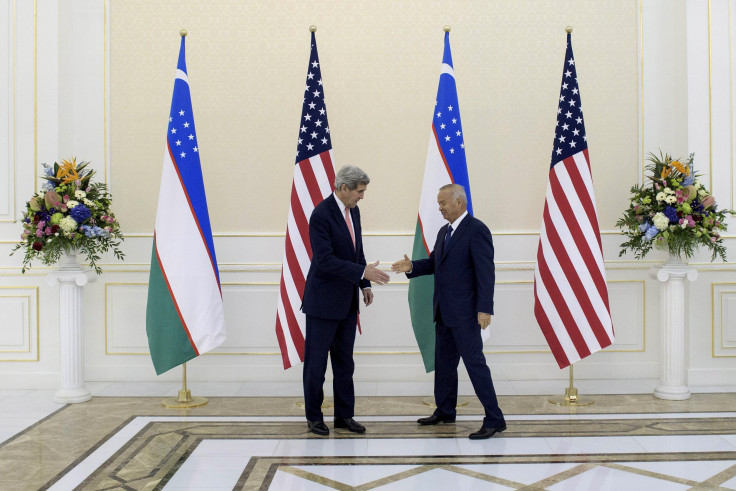US Secretary Of State In First Meeting With Autocratic Uzbek Leader

SAMARKAND, Uzbekistan (Reuters) - U.S. Secretary of State John Kerry met Uzbekistan President Islam Karimov on Sunday during a tour of central Asia, a rare high-level U.S. encounter with the autocratic ruler and frequent target of human rights criticism.
The two held talks in the ancient Uzbek city of Samarkand on the fringes of a diplomatic gathering of his five central Asian counterparts aimed at reassuring them of Washington’s continued engagement in a region seen as exposed to militant Islam.
Most of the five former Soviet republics have poor human rights records, and U.S. officials say Kerry, on his four-day trip, is urging central Asian leaders to expand basic freedoms.
But such issues are not likely to dominate his agenda. Kerry is seeking to persuade governments that Washington's interest in the region, which lies to the north of Afghanistan, is not waning.
That message has taken on greater importance as Washington draws down its forces in Afghanistan, concerns mount about the threat to the region from Islamic State, and Russia, fresh from forays into Ukraine and Syria, reasserts its influence.
It was Kerry’s first meeting as secretary of state with Karimov, who has ruled mostly Muslim Uzbekistan for a quarter of a century since shortly before the collapse of the Soviet Union.
Kerry made no explicit mention of human rights when reporters were allowed briefly into the meeting room.
But he alluded to those concerns, saying he wanted to talk with Karimov and central Asian foreign ministers “about the human dimension, the issues of individuals and their participation in society” to define the future of their countries.
As security men starting ushering reporters out of the room where the meeting was taking place, one American reporter shouted a question to Karimov seeking his response to the U.S. State Department’s critique of the Uzbek human rights record.
Karimov ignored the query. Kerry began responding but the reporter was pushed out of the room before he finished what he was saying.
International human rights bodies list Karimov’s government as among the world’s most repressive. The latest State Department global report on human rights cites torture, forced labor in the Uzbek cotton fields and “endemic corruption”.
But at the same time Uzbekistan has been a reliable strategic partner providing logistical support for the U.S.-led military campaign in neighboring Afghanistan.
The renewed U.S. focus on central Asia coincides with a chorus of warnings from Russian officials about the danger of Islamic State militants infiltrating the region from Afghanistan, accompanied by hints Moscow will respond by beefing up its military presence.
Though Russian officials say they are driven only by concern about militants, not geo-political rivalry with Washington, their heightened attention risks fuelling U.S. suspicions that Moscow is trying to rebuild its old empire.
In his talks with Karimov, Kerry said he shared central Asian countries’ security concerns about Afghanistan and also recognized the challenge they faced in countering radical extremists, especially Islamic State and al Qaeda.
He praised Karimov’s government for preserving the historic sites at Samarkand, once a central stop on the Silk Road trade route, and called it a “stark contrast” to Islamic State’s destruction of ancient monuments in the Syrian town of Palmyra.
Kerry and his aides have touted his itinerary as the first time that a U.S. secretary of state has visited all five ex-Soviet republics in succession on a single trip.
© Copyright IBTimes 2024. All rights reserved.











